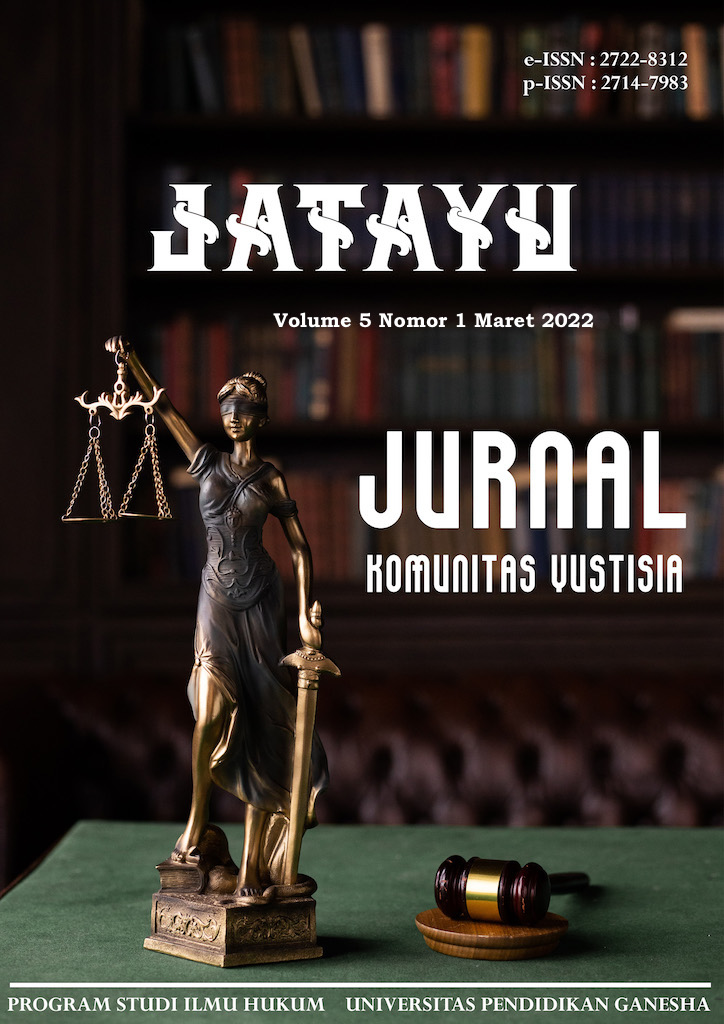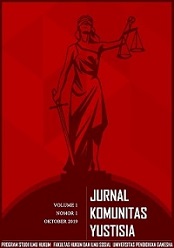EKSISTENSI PELAKSANAAN TRADISI MANAK SALAH DI DESA ADAT PEDAWA KECAMATAN BANJAR KABUPATEN BULELENG (DALAM PERSEFEKTIF PERATURAN NOMOR 10 TAHUN 1951 TENTANG PENGHAPUSAN TRADISI MANAK SALAH )
DOI:
https://doi.org/10.23887/jatayu.v5i3.51898Keywords:
Implementasi, Peraturan Daerah Perkawinan, Manak Salah, dan Desa Adat Pedawa.Abstract
Penelitian ini bertujuan untuk (1) mengetahui dan menganalisa mengenai prosesi pelaksanaan tradisi manak salah di Desa Adat Pedawa, serta (2) mengetahui dan menganalisa Peraturan Nomor 10 Tahun 1951 Tentang Penghapusan Tradisi Manak Salah di Desa Adat Pedawa. Jenis penelitian yang digunakan adalah penelitian hukum yuridis empiris, dengan 2 (dua) jenis pendekatan yaitu pendekatan peraturan perundang-undangan dan pendekatan kasus. Lokasi penelitian ini dilaksanakan di Desa Adat Pedawa, Kecamatan Banjar, Kabupaten Buleleng. Bahan hukum yang digunakan berasal dari bahan hukum primer, sekunder dan tersier dengan teknik pengumpulan menggunakan teknik studi dokumen, observasi dan wawancara. Teknik penentuan sampel yang digunakan adalah teknik non probability sampling dengan bentuk penerapan menggunakan teknik purposive sampling. Teknik pengolahan dan analisis data dilakukan secara kualitatif dengan bentuk penerapan menggunakan model analisa hermeneutika hukum. Hasil penelitian menunjukkan bahwa (1) proses pelaksanaan tradisi Manak salah di Desa Adat Pedawa terdiri dari 3 (tiga) tahapan yaitu persiapan, mebyakaon dan mekecis atau metirta, (2) implementasi Peraturan Nomor 10 Tahun 1951 Tentang Penghapusan Tradisi Manak Salah di Desa Adat Pedawa belum terlaksana dengan baik yang disebabkan karena adanya pelaksanaan tradisi yang masih dilakukan oleh krama Desa Adat Pedawa.
Downloads
Published
Issue
Section
License

This work is licensed under a Creative Commons Attribution-ShareAlike 4.0 International License.
Authors who publish with this journal agree to the following terms: Authors retain copyright and grant the journal right of first publication with the work simultaneously licensed under a Creative Commons Attribution License that allows others to share the work with an acknowledgement of the work's authorship and initial publication in this journal. Authors are able to enter into separate, additional contractual arrangements for the non-exclusive distribution of the journal's published version of the work (e.g., post it to an institutional repository or publish it in a book), with an acknowledgement of its initial publication in this journal. Authors are permitted and encouraged to post their work online (e.g., in institutional repositories or on their website) prior to and during the submission process, as it can lead to productive exchanges, as well as earlier and greater citation of published work (See The Effect of Open Access). Authors who publish with this journal agree to the following terms: Authors retain copyright and grant the journal right of first publication, with the work [SPECIFY PERIOD OF TIME] after publication simultaneously licensed under aCreative Commons Attribution License that allows others to share the work with an acknowledgement of the work's authorship and initial publication in this journal. Authors are able to enter into separate, additional contractual arrangements for the non-exclusive distribution of the journal's published version of the work (e.g., post it to an institutional repository or publish it in a book), with an acknowledgement of its initial publication in this journal. Authors are permitted and encouraged to post their work online (e.g., in institutional repositories or on their website) prior to and during the submission process, as it can lead to productive exchanges, as well as earlier and greater citation of published work (See The Effect of Open Access).






